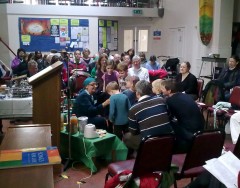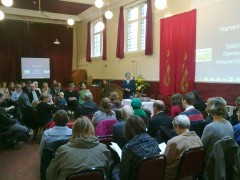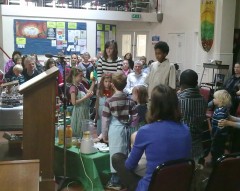We had our harvest thanksgiving this morning and it was SO good!
People kept on arriving and arriving until there was nowhere left for anyone to sit.
The All Age approach seemed to really work, with the children relaxed and happily joining in to the extent they wished as we made the Galatian Holy Smoothie (recipe below) and thought about our favourite smells. The Operation Agri "children's" video provided our main information on projects but we also thought about the juice and aroma therapy oil projects.

Our 'thought for the day' imagined God has the 'master perfumier' or the 'supreme smoothie make' who chooses the right combination of flavours/scents and expertly crushes them in such a way that the lovely flavours or beautiful scents are preserved and enjoyed. Unlike the supermarkets and high street stores that only want perfect specimens, God works with bruised apples, speckled bananas and even mouldy strawberries, valuing their inherent potential and gently but firmly combining them in a thing called a church to create something truly amazing. We steered clear of a God who likes to break people and centred on a loving God who brings out the best we can be. I think it worked.
When it came to Communion we had two adults and two young children serving and it really worked. I was afraid of grumbles but thankfully they didn't come. The children combined dignity with energy, sobriety with wonder - I was blessed by it. Afterwards someone told how her own daughter when growing up and being excluded from communion complained about missing the party. No one missed out today.
The student lunch was well received with a good dozen or so students staying (a number of others had to leave due to other commitments) including one or two who were with us for the first time.
All in all a great morning.
Now, even my Greek is good enough to know that the fruit of the Spirit is singular, not plural, but our smoothie, which the children assured me was delicious, was 'nine alive' as follows:
1/4 pint apple juice - love
1 banana, peeled and sliced - joy (a yellow smile!)
1 pear, peeled, cored and diced - peace
1 orange, peeled and segmented and 1/4 pint orange juice - patience (quality needed to peel an orange!)
1 kiwi fruit, peleed and sliced/diced - kindness
1 cup red seedless grapes - goodness
1 cup fresh pineapple chunks - faithfulness
1 cup of assorted melon chunks (or 2 slices peeled and diced) - gentleness
1 cup strawberries - self control (!)
Place all the ingredients in a liquidiser and blitz until smooth. Ours was a lovely pink colour.
An alternative is my Galatians 5 Fruit Salad. Ingredients as above except omit the juice, add one apple, cored and sliced/diced and use diet lemonade (living water!!) as the liquid. Low calorie and scrummy. Enjoy!
Photos (c) Ian Sinclair 2010


